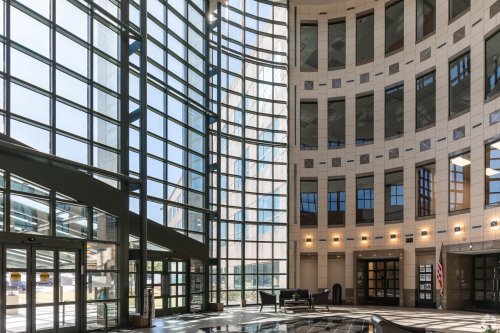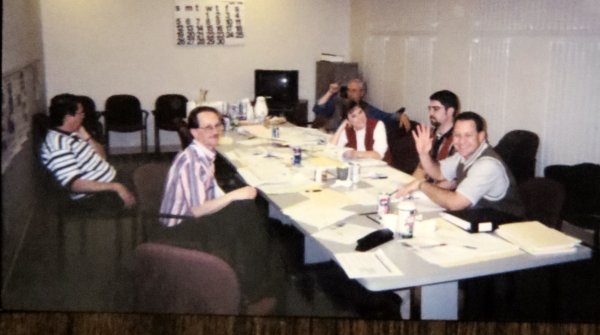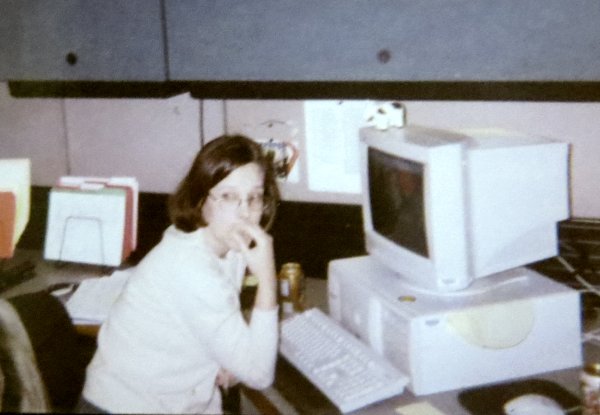Holding company in Birmingham, AL. Continue reading
Proffitt’s (under the name of the Elliott-Proffitt Co.) began in 1919 as a department store in downtown Maryville (locally pronounced MARE vuhl) TN. Decades after it became a chain of department stores TSI’s AdDept system was installed in its advertising department. The account of that process is detailed here.
In 1984 the company and all of its stores were purchased by the RBM Acquisitions Co. It was led by R. Brad Martin, who had previously been a very young member of the Tennessee Legislature and a real estate mogul. Proffitt’s Inc. soon began an ambitious series of acquisitions and openings of new stores. In 1994 it purchased McRae’s, a chain of department stores based in Jackson, MS, that was actually larger than Proffitt’s by any measure except ambition.
Previous new stores that had been purchased by RBM were run under the Proffitt’s logo and administered from the company’s headquarters in Alcoa, TN. McRae’s was allowed to run as a separate division, as were subsequent acquisitions of the Parisian, Younkers, Herberger’s, and Carson Pirie Scott.
After the Parisian division was acquired, the corporate headquarters was moved to a beautiful office located at 750 Lakeshore Parkway2 on the north side of Birmingham, AL. However, all advertising was still administered by each local division in its home location. The data center and the IT department were at McRae’s headquarters in Jackson, MS.
TSI had repeatedly sent promotional materials to advertising directors at each of the divisions. Doug Pease, TSI’s marketing director, followed up on the mailings and eventually encountered Fran Jose2, who was a top executive of Proffitt’s Marketing Group (PMG), the organization that supervised the advertising departments in the divisions. He was impressed enough with the AdDept system that PMG made the decision to implement it in each of the advertising departments. By the time that I got involved in this endeavor Fran had moved on. This was fine. Doug referred to him as “a little Napoleon”.
In 1998 Proffitt’s Inc. bought Saks Fifth Avenue and immediately changed the name of the company to Saks Inc. AdDept had been installed in all of the divisions, including Saks, although Carson’s was no longer using the system (as explained here). In 2000 Martin divided the company into two divisions. One was Saks, the other was everyone else. Martin then moved to New York and ran Saks with little success for a few years before he had to sell it and all of the other pieces of his crumbling empire.
The people: I dealt mostly with Steve VeZain3, who hailed from Louisiana and LSU. He joined PMG in September of 1997. Steve had rather grandiose plans about managing the advertising departments of the various divisions. He made a couple of trips to visit TSI to discuss some of them. Only a few of those were ever put into play. I have rather extensive notes dating from 1999 about our interactions.
Steve’s wife worked in the same building in Birmingham as he did, but I think that she was a buyer or maybe the boss of buyers for the Parisian.
Steve took me to supper several times when I was in Birmingham. His favorite restaurant was Joe’s Crab Shack. I think that his wife accompanied us on one occasion.
I fond the above photo after I had posted this entry. I think that it must have been taken in 1996 or 1997 after the installation at Younkers but before the installation at Proffitt’s. I have no memory of this meeting, but attached post-its identified the participants. From left to right they were Tom Henry from Proffitt’s, Roger Wolf from Younkers, Tom Waltz and Cindy Karnoupakis from Proffitt’s, a guy named Chris from Younkers, and Steve VeZain.
One of Steve’s first moves was to hire Josh Hill, a native of Minnesota who was a recent graduate of the University of Alabama at Birmingham. In fact, Despite his accent, Josh was designated as Mr. UAB in 1997.
I spent a fair amount of time with Josh at various divisions. Steve sent him to oversee some of the AdDept installations, and he accompanied Steve on at least one of his visits to TSI.
Josh liked to lift weights and to ride his motorcycle at high speeds. I don’t know why he (or anyone else who grew up north of the Mason-Dixon line) decided to come to Birmingham for his education.
In late 1999 my sister, Jamie Lisella, quit working at TSI and moved to Birmingham to work for Steve VeZain at PMG. The circumstances have been detailed here.
In January of 2000 Jamie told me that Josh’s car had been involved in a serious accident, but he was OK. She also informed me that the employees at Saks Inc. were allowed to sign on to the Internet, and many of them wasted a lot of time there.
I have only sketchy memories of others who worked at PMG (or whatever it was later called). Kathy D’Andrea kept the corporate books for marketing. I don’t remember her, but I found a photo of her. One of the documents that I found mentions that she would be at Herberger’s at the same time that I was scheduled, but I do not remember seeing her there.
Dave Weeast was in charge of the AS/400’s for all of the divisions. We dealt with him fairly often, but I don’t think that I ever met him. I think that he worked in Jackson, MS, for Windell Manuel5.
I have no recollection of Corky Wicks6, who worked as a business analyst for the company from 1997-2006, but his name is in my notes.
By March of 2001 Jamie had left Saks Inc. I found an email from her to Dave Weeast and Windell Manuel, about the five AS/400’s that had been running AdDept.
What was the purpose of PMG? I had the impression that it did not have a specific agenda. Perhaps the idea was to impose standards upon the advertising departments of the divisions that had, in most cases, been operating independently for decades. What standards? I think that was a big part of the problem. TSI probably did not help. One of our selling points was that the system was easily adaptable to different philosophies of the administration of marketing. Some of the procedures used by the divisions were real outliers.
I think that Steve, Josh, and Jamie had all left Saks by early 2001. Perhaps the marketing group itself had been disbanded. The other organizations that we had worked with had nothing that was similar to PMG.
SPM: All five divisions (and even Saks Fifth Avenue) had been using an ad agency named SPM to place their newspaper ads. Saks dropped them some time in 1997 or 1998. All of the divisions hated working with SPM. Steve decided to drop them in the Spring of 1999. This was a break for TSI. All the divisions suddenly needed to produce insertion orders. We were rapidly able to implement insertion orders and faxing without too much difficulty.
Three interesting visits: This event was not mentioned in my notes, and so it probably happened before July of 1999. When I arrived in Birmingham on the first day of that visit Steve told me that he wanted me to attend a demonstration of a system that was being used for some aspect of either creation or production of ads at Carson’s.
The demo was conducted by two people from a software company that I had never heard of. These two guys were accompanied by Ed Carroll, who was still the Senior VP there. I knew him fairly well. He was the SVP at P.A. Bergner when the company declared bankruptcy in the middle of the AdDept installation. When Ed Carroll saw me he greeted me with a sarcastic “What are YOU doing here?”
I wasn’t quite sure myself. Steve had said that they were interested in implementing an interface with AdDept. After the demo—which I did not think was very good—I went to wherever I was supposed to be on this trip, probably upstairs in the Parisian advertising department. I later asked Steve if he wanted me to pursue this and quote an interface. He quickly dismissed that idea.
On another trip the SVP of advertising for Herberger’s—I don’t remember his name—was there for a meeting. At the time Herberger’s was about open two new stores in the Minneapolis area. They had scheduled an open house to hire people to work in the stores, but they had forgotten to run ads in the local newspapers. He spent several hours on the phone with local radio stations dictating copy to them and begging them to run ads for his company. I found it amazing that he did not trust anyone back in St. Cloud to handle this for him.
I also encountered the advertising director from Saks Fifth Avenue, the company that had just been acquired. I don’t remember her name, but at the time I knew her fairly well. I always wondered why she was in Birmingham that day. Maybe they were just telling her not to worry about any interference in the way that SFA did business.
The big project: At the end of July in 1999 Steve and Josh came to TSI’s office and described how they wanted a system for the corporate marketing group that was fed by the other five systems. Apparently they were able to sign on to the systems and get some of the information that they wanted. However, they wanted all of this to happen automatically when the departments closed their books at the end of the month.
I could see many problems. The divisions did not all play by the same rules. The May Company and Macy’s had methods of standardizing the reporting of their many and diverse divisions. I knew that some of the Saks Inc. divisions were keeping their records in ways that were anything but standard. I am not sure that some of them were even legal. This sounded to Denise Bessette and me like a huge amount of work with no evident benefit.
Problems at the divisions: My notes from 2000 foreshadow some big problems that were beginning to appear:
The infrastructure at the divisions needs attention. Each division has only one printer, and it fails often. They should get the most recent version of Client Access and set up sessions for the printers (at least some of which were put on the Mac networks for some reason). Some divisions use a version of 5PM Mac software that has bugs. Dave Weeast is in charge of all of the AS/400’s in Saks Inc., and he is hard to get in touch with.
The divisions cannot approve requests unless they take it out of their own budgets, which they will do under practically no circumstances. The current process for approving requests is difficult. The divisions request something. Denise and I write a description of it and send it to Jamie. She runs it by Steve when she gets a chance. There are dozens of issues from the divisions from the pre-Jamie period that have never been addressed. If Steve thinks there is some merit in the request (which usually means that one of the Senior VP’s has been yelling at him), he tells me to quote it. I quote it and send the quote to Jamie. She tries to get Steve to look at it and approve it.
I can’t look at hobbles, and I can’t stand fences. Don’t fence me in.
The email: By 2000 AdDept systems had been installed on separate AS/400 systems in Des Moines IA (Younkers), Alcoa TN (Proffitt’s), Jackson MI (McRae’s), St. Cloud MN (Herberger’s), and Birmingham (Parisian). When the responsibility for advertising for McRae’s was transferred to the Proffitt’s division, and the ad scheduling for Herberger’s was moved to the Carson’s division, Jamie arranged for the McRae’s and the Herberger’s AS/400 systems to be shipped to the computer room in Birmingham. I know this because I was a cc on an email that she sent to Dave Weeast and Windell Manuel on March 29 of 2001.
Dave, Windell,
I understand there is some confusion regarding the location and status of the five AS/400’s that I administered. I will be happy to work with the two of you to facilitate any restructuring of these systems. I would prefer to communicate only with you, as I have not had much, if any, cooperation from the personnel in Birmingham and I am tired of doing charity work. I reviewed this information repeatedly with management and IT staff at Saks Inc. prior to my departure. I would like to reiterate that sending one of these AS/400’s to Jackson for their big ticket system was being done as a favor.
There are three systems on hand in Birmingham; PARADV, HERBADV and MCRAEADV. All three boxes are located in the computer room on the second floor. The PARADV system is active and used by the advertising department of Parisian. Operating system level is V4R2, but the upgrade package V4R4 is on hand in Birmingham.
HERBADV and MCRAEADV are the surplus AS/400 systems due to fusion. I had these boxes transported to Birmingham last fall and upgraded the operating systems on both to V4R4. The IP addresses for network connection for these systems has been issued through Jackson and changed on both of the AS/400’s. However, the connection failed. I had been working with Jerry Aultman in Birmingham’s IT Department to get this resolved. My hunch is that the problem lies with the DNS entry, or lack thereof. Additionally, the advertising personnel also utilize the IBM FAX/400 product which requires installation of an inbound and outbound fax line via 7852 modem.
I ordered these lines through Jeff Bass. Although I provided him with account numbers to pay for installation and usage on these lines, as of my departure on 3/14, I had not been advised that they were installed and functional.
The fourth system, YNKADV, is physically located in Des Moines. This machine is an older model 40e. This is the system I had planned to ship to Jackson for the Big Ticket application. Before it can be shipped, the network connection on the HERBADV AS/400 must be resolved and the MAC connectivity issues addressed. Two phone lines must be active. The base AdDept software application is intact on this box. The data libraries for TSI’s AdDept application need to be copied and installed. TSI will need to consult on this process, as well as the installation of any subsequent custom software programming and the fax configuration. I have cleared out the user profiles on the HERBADV box and added the current Younkers’ users.
I had also planned to move the existing PROFADV system (located in Alcoa, TN – V4R2- also an older model) to the MCRAEADV box. The MCRAEADV system holds the base software previously used by McRae’s advertising personnel. This will be an advantage on the software side. Once again, the network, phone, fax and software issues described above apply to PROFADV, also.
All of these AS/400’s are covered by a software subscription valid through December, 2001. PARADV, HERBADV, MCRAEADV and PROFADV are all covered by a one-year, 24 x 7, focal point contract for IBM hardware and software. The YNKADV system is set up on monthly maintenance, so that the monthly payment could be assumed by Jackson after it is transported there. However, I did purchase a software subscription for YNKADV, so the Jackson personnel could order the OS upgrade at no cost. Mike Wavada at TSI should be able to assist with any questions regarding the IBM maintenance, as they were purchased through his company as a business partner with first right of refusal.
If there are any additional issues, please let me know.
I found this email remarkable. I don’t remember what model of AS/400 Younkers had, but there was never a model e40. However, the most remarkable thing was that Jamie had, at least according to this email, arranged for the two boxes to be shipped from St. Cloud and Jackson. I doubt that anyone cared much about the box in Herberger’s advertising department, but the one in Jackson was in the corporate data center. I cannot imagine how she had managed to get it out of there. It took a lot of chutzpah and, I imagine, some maneuvering.
After Steve, Jamie, and (presumably) Josh left Saks Inc. in 2001, we still had rather good relationships with the advertising people at Younkers, Proffitt’s, Parisian, and, especially, Saks Fifth Avenue. We were never able to convince Carson’s to use the AdDept system even after the division was purchased by the Bon Ton, which had been using it for years.
1. Incredibly, Brad Martin has no Wikipedia page. A biography is posted here.
2. Beautiful photos of this building were posted here. It is apparently occupied in 2022 by Evonik Industries.
3. I don’t think that I ever got to meet Fran Jose. He does not appear to have a LinkedIn page.
4. Steve VeZain left Saks Inc. in 2001. His LinkedIn page is here.
5. 6. Windell Manuel’s LinkedIn page is here.
6. Corky Wicks LinkedIn page is here.
7. SPM was affiliated with an agency that handled newspaper advertising for Sears and a few other retailers. The two agencies were across the street from each other. I met with them when I visited Sears. That adventure is recounted here. In 2023 SPM was still in business. Its website could be found here.








Pingback: 1991-2012 TSI: AdDept: The Whiffs | Wavablog
Pingback: 1999-2002 TSI: The Million Dollar Idea | Wavablog
Pingback: 1996-2003 TSI: AdDept Client: Younkers | Wavablog
Pingback: 1996-2005 TSI: AdDept Client: Proffitt’s | Wavablog
Pingback: 1997-2006 TSI: AdDept Client: Parisian | Wavablog
Pingback: 1998-1999 TSI: AdDept Client: Herberger’s | Wavablog